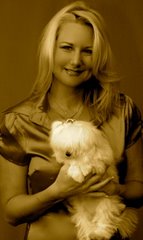FOR REAL
Authenticity is something I've been giving a lot of thought lately. Being an authentic blonde seems like somewhat of an oxymoron. I know that if "they" were passing out certificates for true "blondeness", I would definitely get a honkin' gold star honorable mention. But, what does it mean to be truly authentic. I have been criticized at this point before, and I guess I'm an easy target. Some things about me are so typical. i.e.:
1. One time my daughter told a "your mama" joke to which I replied "No, your mama!"
2. I love high-heels even though I'm too tall to begin with - most Sundays I'm around 6'1".
3. I have a purse-dog named "Sugar Boy" (someone once suggested that I should've given him a more masculine name, but he weighs two pounds and has a bow in his hair -- I don't really think the name "Spike" would help).
4. Over the years, I have developed my own sense of style -- it began when I was about seven and my mom's best friend said to her, "You've got to stop letting Angie dress herself!" and continues today with the people saying something like, "I would've never thought to put those pants with that shirt."
5. I'm learning how to use the computer as I'm writing this blog.
6. I'm a self-professed "drama queen preacher's wife" who (here's the real shocker) sings.
I could probably go on indefinitely - and that's just the stuff I'll admit. But, it's not just those typical things that make my "blondeness" significant, it's that I've become okay with it.
Many people, especially in the church-world, would define a good pastor's wife in certain terms. I was told one time that my "problem" (and Byron's) was that I didn't care enough what "people" think. That may be one of the most honest things I've ever been told. I've been fighting this illness for a long time - the "what will people think" illness that is so epidemic among women, especially church-women, and most especially pastor's wives. As a pastor's kid turned pastor's wife, I've suffered from this disease for as long as I can remember. My parents did a good job of trying to fight this phenomenon, and Byron has always done his best to protect my individuality. But it's just the nature of the beast.
So, I'm okay with whatever stereotypes people may place on me - I'm sure I encourage them on many levels. But, it's not my intention to say "Don't define me by my blondeness" - or any other superficial criteria - It's my intention to say that I'm okay with whatever people want to label me. Usually, labels have to do more with the critic's own issues than reality. I'm okay with not being everyone's ideal of a pastor's wife. I'm okay with judgments about how I dress, or how I look, or what I say - it goes with the territory. What I'm not okay with is the assertion that I'm not "authentic" because I don't fit a particular ideal. Authenticity is about being real. Who decides what the "real" Angie looks like. God made me the way I am, it's just my job to be okay with that, and to be okay with whatever "people" have to say about it. I just want others to experience the freedom I've found in embracing my true identity - blondeness and all. By God's grace (because that's the point of all this), I want to stop caring what "they" think and be something a lot less typical: real - even if it's wrapped-up in a brightly-colored, bedazzled, too blonde, too tall, too dramatic package. I'm okay with it, and I'm okay without it.
At the end of the day, authenticity is what's going to draw people to an authentic God. Jesus didn't take a poll of His popularity or apologize for His methods or message. So, I'll keep Him before me, and I'm sure He can deal with me, blondeness and all. Antithesis means to find the opposite of what you expect. Besides, how often do you see "blonde" next to a big word anyway.


No comments:
Post a Comment